Nerine Dorman's Blog, page 28
September 14, 2019
Kill Baxter by Charlie Human
Following on the breakneck speed of Apocalypse Now-Now, Charlie Human's anti-Harry Potter, Baxter, is back. This time he has to attend a school for the magically inclined – a rather nasty place in the middle of nowhere aptly named Hexpoort. In typical Human style, Kill Baxter is a non-stop romp from one misadventure to the next, as we are plunged deeper into the world of the Hidden, and those who have to stop that world from spilling out into our own.
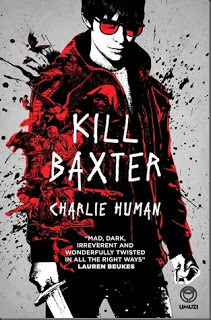 It's not a walk in the park for Baxter, who up until the events unfolding in book one, has lived a rather mundane life. Now he discovers he's apparently a dreamwalker – a rare ability – and he has precious little time to come into his powers before he is dragged into conflict. The kids at his new school aren't helping much either – if ever there existed a motley collection of reprobates, this is it. What doesn't help is that the resident Chosen One (a nod to Harry Potter himself) is an unmitigated tosser with a penchant for pushing Baxter around.
It's not a walk in the park for Baxter, who up until the events unfolding in book one, has lived a rather mundane life. Now he discovers he's apparently a dreamwalker – a rare ability – and he has precious little time to come into his powers before he is dragged into conflict. The kids at his new school aren't helping much either – if ever there existed a motley collection of reprobates, this is it. What doesn't help is that the resident Chosen One (a nod to Harry Potter himself) is an unmitigated tosser with a penchant for pushing Baxter around.
After saving the world the first time, Baxter has decided to turn over a new leaf. So he keeps holding himself back from being the unholy terror he was in book one. And this division of his light/dark self does create problems for him as he goes along – he needs to find his true self before he can come fully into his powers, and the way things go, he may not survive to do so.
Kill Baxter is full of absurd humour, ultra violence and often unexpectedly wry observations about the human condition – something that's difficult to get the balance right. I did feel, however, at times, that the writing is a bit fast, that the overall plot development (as it does in book one) occasionally gets derailed in favour of the style, but somehow Human pulls it off far better in book two than book one. Perhaps it's because he's more comfortable in the world now, knows the characters better.
There's something almost Pratchettesque about the setting, in an Ankh-Morpork kinda way, but far, far darker, and steeped in African mythology. I also suspect that some of the references will no doubt go way over the heads of non-South African readers. But I also reckon that this sprawling contemporary fantasy novel will hit the mark too, because its themes will, by the same measure, seem so fresh to many non-South African readers. Kill Baxter is fast, funny and sometimes quite silly, but at the end of the day it's one heck of a ride.
 It's not a walk in the park for Baxter, who up until the events unfolding in book one, has lived a rather mundane life. Now he discovers he's apparently a dreamwalker – a rare ability – and he has precious little time to come into his powers before he is dragged into conflict. The kids at his new school aren't helping much either – if ever there existed a motley collection of reprobates, this is it. What doesn't help is that the resident Chosen One (a nod to Harry Potter himself) is an unmitigated tosser with a penchant for pushing Baxter around.
It's not a walk in the park for Baxter, who up until the events unfolding in book one, has lived a rather mundane life. Now he discovers he's apparently a dreamwalker – a rare ability – and he has precious little time to come into his powers before he is dragged into conflict. The kids at his new school aren't helping much either – if ever there existed a motley collection of reprobates, this is it. What doesn't help is that the resident Chosen One (a nod to Harry Potter himself) is an unmitigated tosser with a penchant for pushing Baxter around.After saving the world the first time, Baxter has decided to turn over a new leaf. So he keeps holding himself back from being the unholy terror he was in book one. And this division of his light/dark self does create problems for him as he goes along – he needs to find his true self before he can come fully into his powers, and the way things go, he may not survive to do so.
Kill Baxter is full of absurd humour, ultra violence and often unexpectedly wry observations about the human condition – something that's difficult to get the balance right. I did feel, however, at times, that the writing is a bit fast, that the overall plot development (as it does in book one) occasionally gets derailed in favour of the style, but somehow Human pulls it off far better in book two than book one. Perhaps it's because he's more comfortable in the world now, knows the characters better.
There's something almost Pratchettesque about the setting, in an Ankh-Morpork kinda way, but far, far darker, and steeped in African mythology. I also suspect that some of the references will no doubt go way over the heads of non-South African readers. But I also reckon that this sprawling contemporary fantasy novel will hit the mark too, because its themes will, by the same measure, seem so fresh to many non-South African readers. Kill Baxter is fast, funny and sometimes quite silly, but at the end of the day it's one heck of a ride.
Published on September 14, 2019 03:38
September 12, 2019
Falada by Angela D Mitchell
What I love about particular fandoms (yes, I'm looking at you, Dragon Age) is that they connect me with likeminded souls. Angela D Mitchell is one such writer, whose thought-provoking blogs have sent me down numerous nug warrens. Also, her fanfiction is especially lush – and she focuses so well on the nuances of characters' interaction with so much layering and a ring of authenticity. Naturally, when she mentioned that she also writes original fiction, her fantasy novella Falada ended up being an insta-buy on my list.
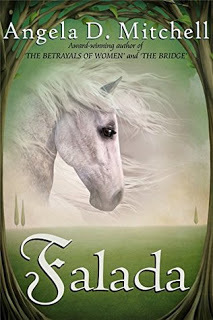 I'm going to go out on a limb and compare her writing style to Neil Gaiman's right off the bat. She has an understanding of story structure, especially in terms of taking the form of a fairytale and making it her own, then subverting it with all the touchstones we've come to know and love, from wicked witches, enchanted steeds and princesses.
I'm going to go out on a limb and compare her writing style to Neil Gaiman's right off the bat. She has an understanding of story structure, especially in terms of taking the form of a fairytale and making it her own, then subverting it with all the touchstones we've come to know and love, from wicked witches, enchanted steeds and princesses.
Falada is the story of the princess Géanna, whose mother is the wicked witch. It's the tale we know all too well – a princess must marry a king and become queen. Only Géanna isn't your bog-standard, typical princess. And as much as she loves her mother, she chafes at her mother's manipulations. Yet Géanna is an obedient daughter, up until a point. It's when she starts to take matters into her own hands that her fate unravels, and she's faced with the task of trying to right the wrongs that have placed her where she is. Of course nothing runs smoothly, but I'm not going to spoil it for you.
Okay. I love Mitchell's writing. I will most likely go out and buy the next book she publishes without batting an eyelid. Was Falada perfect? It wasn't, but Mitchell's wordcraft is magic. I feel almost as if the novella wanted to be a novel rather than a novella, and that's my only real bone to pick. Things are left at a 'happy for now' by the end, but I feel that the outcome at the climax was a little bit rushed, too easily resolved almost. And I think this is something that might've been fixed with a brainstorming at the developmental stages of the writing.
This wasn't a dealbreaker, however, and if you've enjoyed Stardust, you'll most certainly enjoy Falada. Read it with my blessings. It's a lovely story, and one that I'll be thinking about for a while yet.
 I'm going to go out on a limb and compare her writing style to Neil Gaiman's right off the bat. She has an understanding of story structure, especially in terms of taking the form of a fairytale and making it her own, then subverting it with all the touchstones we've come to know and love, from wicked witches, enchanted steeds and princesses.
I'm going to go out on a limb and compare her writing style to Neil Gaiman's right off the bat. She has an understanding of story structure, especially in terms of taking the form of a fairytale and making it her own, then subverting it with all the touchstones we've come to know and love, from wicked witches, enchanted steeds and princesses.Falada is the story of the princess Géanna, whose mother is the wicked witch. It's the tale we know all too well – a princess must marry a king and become queen. Only Géanna isn't your bog-standard, typical princess. And as much as she loves her mother, she chafes at her mother's manipulations. Yet Géanna is an obedient daughter, up until a point. It's when she starts to take matters into her own hands that her fate unravels, and she's faced with the task of trying to right the wrongs that have placed her where she is. Of course nothing runs smoothly, but I'm not going to spoil it for you.
Okay. I love Mitchell's writing. I will most likely go out and buy the next book she publishes without batting an eyelid. Was Falada perfect? It wasn't, but Mitchell's wordcraft is magic. I feel almost as if the novella wanted to be a novel rather than a novella, and that's my only real bone to pick. Things are left at a 'happy for now' by the end, but I feel that the outcome at the climax was a little bit rushed, too easily resolved almost. And I think this is something that might've been fixed with a brainstorming at the developmental stages of the writing.
This wasn't a dealbreaker, however, and if you've enjoyed Stardust, you'll most certainly enjoy Falada. Read it with my blessings. It's a lovely story, and one that I'll be thinking about for a while yet.
Published on September 12, 2019 10:49
September 8, 2019
A Darker Shade of Magic (Shades of Magic #1) by VE Schwab
A Darker Shade of Magic by VE Schwab is book 1 of her Shades of Magic trilogy, and I picked it up a while back when it was available as a freebie. She's also one of those authors whom I've been wanting to try out awhile now, and I'm very glad that I've had this opportunity. (I also rushed out immediately to pick up book 2, once I was done with book 1, so that says something about the calibre of the writing.)
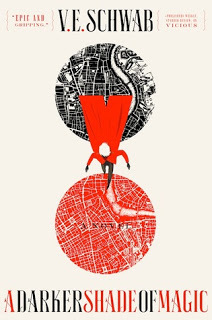 There are many Londons – Black London, which has been locked away for a very good reason; White London, where there are ruthless practitioners of magic; Red London, where there seems to be a healthy balance between magic and user; and of course Grey London, which is as the name suggests – where magic is rare. Magic is hungry, and wants to be used, but it's mainly the province of the Antari, master magicians who are able to walk between the various Londons. But the Antari are few, and it seems that they are a dying breed. Very soon there will be no contact between the various dimensions. And maybe that is as it should be.
There are many Londons – Black London, which has been locked away for a very good reason; White London, where there are ruthless practitioners of magic; Red London, where there seems to be a healthy balance between magic and user; and of course Grey London, which is as the name suggests – where magic is rare. Magic is hungry, and wants to be used, but it's mainly the province of the Antari, master magicians who are able to walk between the various Londons. But the Antari are few, and it seems that they are a dying breed. Very soon there will be no contact between the various dimensions. And maybe that is as it should be.
Lila Bard is a crossdressing cutthroat and thief in Grey London, and she wants more from life. Perhaps she would have remained in her dimension if it weren't for the day she crossed paths with Kell, and the two get plunged into a quest that threatens the integrity of all the Londons. More than that, I won't say, except that Schwab has created a wonderful, well-realised setting where she twists and turns her narrative around every corner, and pulls the proverbial rug from beneath readers' feet effortlessly.
A Darker Shade of Magic never lets you get truly comfortable, taking readers on a journey from any of the various Londons' underbellies right up into the royal palaces, with many narrow squeaks and danger stalking around every corner. While it took me a few chapters to get to know and like both Kell and Lila, by the end of book 1 I was enjoying the dynamics between the two very much, and I'm sufficiently invested to carry on finding out how these two will continue – and I have my suspicions about Lila, but I'm not going to spoil anything about the story. A thoroughly enjoyable, engaging read, and I'm a firm fan of Schwab's writing from here on in.
 There are many Londons – Black London, which has been locked away for a very good reason; White London, where there are ruthless practitioners of magic; Red London, where there seems to be a healthy balance between magic and user; and of course Grey London, which is as the name suggests – where magic is rare. Magic is hungry, and wants to be used, but it's mainly the province of the Antari, master magicians who are able to walk between the various Londons. But the Antari are few, and it seems that they are a dying breed. Very soon there will be no contact between the various dimensions. And maybe that is as it should be.
There are many Londons – Black London, which has been locked away for a very good reason; White London, where there are ruthless practitioners of magic; Red London, where there seems to be a healthy balance between magic and user; and of course Grey London, which is as the name suggests – where magic is rare. Magic is hungry, and wants to be used, but it's mainly the province of the Antari, master magicians who are able to walk between the various Londons. But the Antari are few, and it seems that they are a dying breed. Very soon there will be no contact between the various dimensions. And maybe that is as it should be.Lila Bard is a crossdressing cutthroat and thief in Grey London, and she wants more from life. Perhaps she would have remained in her dimension if it weren't for the day she crossed paths with Kell, and the two get plunged into a quest that threatens the integrity of all the Londons. More than that, I won't say, except that Schwab has created a wonderful, well-realised setting where she twists and turns her narrative around every corner, and pulls the proverbial rug from beneath readers' feet effortlessly.
A Darker Shade of Magic never lets you get truly comfortable, taking readers on a journey from any of the various Londons' underbellies right up into the royal palaces, with many narrow squeaks and danger stalking around every corner. While it took me a few chapters to get to know and like both Kell and Lila, by the end of book 1 I was enjoying the dynamics between the two very much, and I'm sufficiently invested to carry on finding out how these two will continue – and I have my suspicions about Lila, but I'm not going to spoil anything about the story. A thoroughly enjoyable, engaging read, and I'm a firm fan of Schwab's writing from here on in.
Published on September 08, 2019 02:34
September 5, 2019
The Grey Bastards (The Lot Lands, #1) by Jonathan French
Okay. It's not every day that I discover a new author to stalk get excited about but Jonathan French grabbed me by my short and curlies and yanked so hard, I'm just about counting down the days till his book 2 (The True Bastards) gets released. And you're pretty much guaranteed that I will drop EVERYTHING I'm currently reading to gobble down that book once it's been released. And it's rare that I will froth about a novel as much as I am about this, but there you have it.
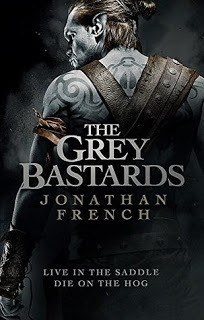 The Grey Bastards is the mongrel offspring of The Lord of the Rings having a secret, boozed-up tryst with Sons of Anarchy, and heavily flavoured with every awful spaghetti western I ever gobbled up as a child. It's action-packed, filled with intrigue, and we follow the half-orc Jackal as he makes one bad decision after the other to save his hoof, The Grey Bastards. Even the concept is just so different from any of the fantasy I've read of late – I mean, you can't get more out there than half-orcs astride giant hogs. As in actual oversized piggies. And yet somehow it works. And it all hangs together for a smashing ride that has a ring of authenticity to its telling.
The Grey Bastards is the mongrel offspring of The Lord of the Rings having a secret, boozed-up tryst with Sons of Anarchy, and heavily flavoured with every awful spaghetti western I ever gobbled up as a child. It's action-packed, filled with intrigue, and we follow the half-orc Jackal as he makes one bad decision after the other to save his hoof, The Grey Bastards. Even the concept is just so different from any of the fantasy I've read of late – I mean, you can't get more out there than half-orcs astride giant hogs. As in actual oversized piggies. And yet somehow it works. And it all hangs together for a smashing ride that has a ring of authenticity to its telling.
French dumps you right in the midst of a dusty, blood-drenched world where the assorted hoofs control territories within the Lot Lands, that act as a buffer between the human kingdom of Hispartha and the incursions of the orcs, who have previously sowed devastation. The assorted hoofs are all that stand between Hispartha and another dreaded incursion, and the half-orcs know it all too well.
French is a masterful storyteller, who effortlessly weaves in threads that eventually pull together into a devastating tapestry at the end. He writes with heart, telling a cracking adventure story but with memorable characters who are all incredibly well defined, set within a world that is heavy with history. I hadn't realised I was looking for a book like this one until I picked it up.
I realise I'm fangirling horribly, but allow me to do so. I was so engaged with this novel I honestly didn't feel like nitpicking at anything. I had way too much fun.
Oh, did I mention this book has elves?
 The Grey Bastards is the mongrel offspring of The Lord of the Rings having a secret, boozed-up tryst with Sons of Anarchy, and heavily flavoured with every awful spaghetti western I ever gobbled up as a child. It's action-packed, filled with intrigue, and we follow the half-orc Jackal as he makes one bad decision after the other to save his hoof, The Grey Bastards. Even the concept is just so different from any of the fantasy I've read of late – I mean, you can't get more out there than half-orcs astride giant hogs. As in actual oversized piggies. And yet somehow it works. And it all hangs together for a smashing ride that has a ring of authenticity to its telling.
The Grey Bastards is the mongrel offspring of The Lord of the Rings having a secret, boozed-up tryst with Sons of Anarchy, and heavily flavoured with every awful spaghetti western I ever gobbled up as a child. It's action-packed, filled with intrigue, and we follow the half-orc Jackal as he makes one bad decision after the other to save his hoof, The Grey Bastards. Even the concept is just so different from any of the fantasy I've read of late – I mean, you can't get more out there than half-orcs astride giant hogs. As in actual oversized piggies. And yet somehow it works. And it all hangs together for a smashing ride that has a ring of authenticity to its telling.French dumps you right in the midst of a dusty, blood-drenched world where the assorted hoofs control territories within the Lot Lands, that act as a buffer between the human kingdom of Hispartha and the incursions of the orcs, who have previously sowed devastation. The assorted hoofs are all that stand between Hispartha and another dreaded incursion, and the half-orcs know it all too well.
French is a masterful storyteller, who effortlessly weaves in threads that eventually pull together into a devastating tapestry at the end. He writes with heart, telling a cracking adventure story but with memorable characters who are all incredibly well defined, set within a world that is heavy with history. I hadn't realised I was looking for a book like this one until I picked it up.
I realise I'm fangirling horribly, but allow me to do so. I was so engaged with this novel I honestly didn't feel like nitpicking at anything. I had way too much fun.
Oh, did I mention this book has elves?
Published on September 05, 2019 02:23
September 3, 2019
Daughter of Shadow (Spiritbinder Saga #1) by Tyler Sehn
Daughter of Shadow by Tyler Sehn is book one in what looks to be a cracking epic fantasy saga. And for those who have a love of military fantasy, this might even push a few of the right buttons – there are fantastic, well-realised locations, bloody battles, strange magic and even stranger beasties. We follow along with Melea, who has a particular power that allows her to harness the elements of things around her to incorporate them into her magical weaponry or armour. This talent of hers has naturally made her incredibly useful to a power-hungry god-emperor – and she acts as his cat's paw on track for his plans of world domination. Mix in a militant, ideologically driven religion to fire up those imperial powers, and you've got a lovely recipe for unfolding drama – especially if characters such as Melea, and to a degree the priest Belenus, act on orders but don't really take time to think about whether what they're doing is right.
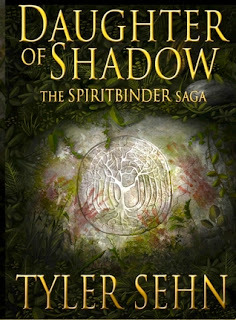 Okay, that's the very basic gist of the novel. But.
Okay, that's the very basic gist of the novel. But.
Yes, there's a but.
This novel needed a developmental editor in a very serious way.
There's no doubt that Sehn is a gifted wordsmith with a talent for storytelling, but he needed an editor to rein him in, and help bring this sprawling epic to heel. Beyond the fact that sometimes viewpoint characters act, with very little understanding of their motivation (especially in terms of Melea's power, which seems to act of its own accord often and confusingly) so that I wasn't always certain whether this was an instinct on her part or a directed action.
Coupled with that is the fact that the novel's pacing and structure needs better focus. Secondary characters are introduced early on, but have no clear connection to the primary plot. Events take place, but don't truly contribute to the narrative going forward. If these sequences had been pruned, and better focus given on an overarching theme – for instance Melea's and Belenus's gradual realisation that their faction may not have the right of it – then we'd be sitting with a far stronger novel in our hands.
As it is, we hurtle towards the end of book one after a number of detours, and are left on a cliffhanger. I'm sure that this won't present a problem for serious fantasy readers who're invested in a multi-book epic, but I'd personally have liked to see things resolved a little tighter by book one, with enough threads to continue further. For an indie-published book this one's not bad, and it's rather ambitious too, but with a little more polish it could've hit closer to the target.
I must give a shout-out to the character Belenus, however. For all his faults, I don't know why I liked him as much as I did. Perhaps because despite his blind adherence to a religion, he was basically a good man who believed he was doing the right thing – and he had the necessary self-reflection to understand once his path was perhaps not the right path after all. Melea herself was too much of a placeholder type character for me – a canvas for the magical powers rather than a living, breathing person with well defined motivations.
 Okay, that's the very basic gist of the novel. But.
Okay, that's the very basic gist of the novel. But.Yes, there's a but.
This novel needed a developmental editor in a very serious way.
There's no doubt that Sehn is a gifted wordsmith with a talent for storytelling, but he needed an editor to rein him in, and help bring this sprawling epic to heel. Beyond the fact that sometimes viewpoint characters act, with very little understanding of their motivation (especially in terms of Melea's power, which seems to act of its own accord often and confusingly) so that I wasn't always certain whether this was an instinct on her part or a directed action.
Coupled with that is the fact that the novel's pacing and structure needs better focus. Secondary characters are introduced early on, but have no clear connection to the primary plot. Events take place, but don't truly contribute to the narrative going forward. If these sequences had been pruned, and better focus given on an overarching theme – for instance Melea's and Belenus's gradual realisation that their faction may not have the right of it – then we'd be sitting with a far stronger novel in our hands.
As it is, we hurtle towards the end of book one after a number of detours, and are left on a cliffhanger. I'm sure that this won't present a problem for serious fantasy readers who're invested in a multi-book epic, but I'd personally have liked to see things resolved a little tighter by book one, with enough threads to continue further. For an indie-published book this one's not bad, and it's rather ambitious too, but with a little more polish it could've hit closer to the target.
I must give a shout-out to the character Belenus, however. For all his faults, I don't know why I liked him as much as I did. Perhaps because despite his blind adherence to a religion, he was basically a good man who believed he was doing the right thing – and he had the necessary self-reflection to understand once his path was perhaps not the right path after all. Melea herself was too much of a placeholder type character for me – a canvas for the magical powers rather than a living, breathing person with well defined motivations.
Published on September 03, 2019 04:42
September 2, 2019
Interview with actor Aidan Whytock
To mix things up a little, I've got South African actor Aidan Whytock in the hot seat today. Not only has he regularly collaborated with my husband on assorted film projects, but he's a familiar face in many of the locally produced films and series. Some of you may have seen him in Black Sails and Warrior, among quite a few productions.
Nerine Dorman: So, the first time we crossed paths, this was quite a few years back with one of the BlackMilk Productions short films. I don’t even remember which. And it’s just occurred to me that in all of those productions, there’s only been one where we’ve actually seen your face.
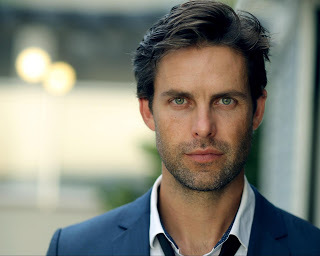 Aidan WhytockAidan Whytock: That’s a great point! The lovely, dark and twisty people at BlackMilk seem to never want to show my face. We’ve had a good few laughs about it on set. Perhaps I have a face for radio?
Aidan WhytockAidan Whytock: That’s a great point! The lovely, dark and twisty people at BlackMilk seem to never want to show my face. We’ve had a good few laughs about it on set. Perhaps I have a face for radio?
ND: Yet there was Alone – now that I think of it. That one was pretty freaky, and I remember we filmed that in the dead of winter. So, we got to know you quite a while back. What were some of the projects you got started with? It would seem now that embarking on a career in the film industry in South Africa has a lot more potential than it did a decade or two ago.
AW: I was starting out and looking for opportunities to explore and experiment. I was elated when I met you guys and the BlackMilk family. You gave me a wonderful platform to do just that; explore and grow. The SA film industry has definitely grown and there are a lot more studio projects and indie filmmakers. It’s a good time to be in the game.
ND: What have been some of your highlights over the past decade or so?
AW: I’ve died in a lot of interesting ways. Hooked, decapitated, blown up, fallen (in space – oh the irony). Black Sails was a brilliant experience. I worked with some superb actors and directors. It was an honour to be directed into and out of the show by the one and only Alik Sarkharov (Game of Thrones). I’ve recently finished up on Warrior. It’s definitely worth checking out – a wild west martial arts series with a cheek sense of humour.
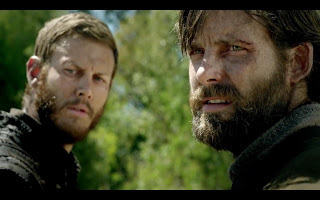 Aidan in Black Sails
Aidan in Black Sails
ND: Warrior is something so special, a definite clash of cultures, and it seems almost impossible to believe that it was filmed in its entirety here in Cape Town. Everything from the styling through to the character arcs is detailed and well thought out. You play Philip Coleman – a somewhat alcoholic lawyer. What were some of your memorable experiences on set? And you didn’t die in this one, for a change ;-)
AW: You’re right – for a change I’m still alive! It was probably some of the most enjoyable work I’ve done, for a few reasons: the cast are all exceptionally talented. On top of that they’re so friendly – they treat the cast and crew as their family. They know they’re in for the long haul so it makes sense to look after each other. But what really made it special was the writing. Jonathan Tropper has created such a layered, subtextual show that it’s hard to not do something vaguely interesting, even though I tried my damnedest to mess it up.
 Aidan as Philip Coleman in Warrior
Aidan as Philip Coleman in Warrior
ND: You’ve also tried your hand at producing feature-length movies – most notably The Actor. And you had quite a wicked time frame in which to film it. The process itself must’ve been quite a learning curve too. Can you tell us a little more about that particular journey?
AW: We set ourselves the challenge of making a feature film on a shoestring budget, and it certainly was that. The Actor was our master class in filmmaking. We worked hard and fast, shot the film in 9 days with just USD3,500 and made something strong enough for a theatrical release. Our big learning: if you want to make a film, nothing is stopping you. Work with great people who like spending time with, find a story you want to tell and make it happen.
ND: And what’s on the cards for you currently?
AW: I’ve just wrapped a post apocalyptic sci-fi in Romania. I’m sworn to secrecy but it’s a novel take on the genre; one in alignment with some topical global challenges. Tonally it echoes some of the genre greats while being its own beast. As soon as the trailer is done I’ll let you know!
Check out Aidan's showreel or visit him over at IMDB.
Nerine Dorman: So, the first time we crossed paths, this was quite a few years back with one of the BlackMilk Productions short films. I don’t even remember which. And it’s just occurred to me that in all of those productions, there’s only been one where we’ve actually seen your face.
 Aidan WhytockAidan Whytock: That’s a great point! The lovely, dark and twisty people at BlackMilk seem to never want to show my face. We’ve had a good few laughs about it on set. Perhaps I have a face for radio?
Aidan WhytockAidan Whytock: That’s a great point! The lovely, dark and twisty people at BlackMilk seem to never want to show my face. We’ve had a good few laughs about it on set. Perhaps I have a face for radio?ND: Yet there was Alone – now that I think of it. That one was pretty freaky, and I remember we filmed that in the dead of winter. So, we got to know you quite a while back. What were some of the projects you got started with? It would seem now that embarking on a career in the film industry in South Africa has a lot more potential than it did a decade or two ago.
AW: I was starting out and looking for opportunities to explore and experiment. I was elated when I met you guys and the BlackMilk family. You gave me a wonderful platform to do just that; explore and grow. The SA film industry has definitely grown and there are a lot more studio projects and indie filmmakers. It’s a good time to be in the game.
ND: What have been some of your highlights over the past decade or so?
AW: I’ve died in a lot of interesting ways. Hooked, decapitated, blown up, fallen (in space – oh the irony). Black Sails was a brilliant experience. I worked with some superb actors and directors. It was an honour to be directed into and out of the show by the one and only Alik Sarkharov (Game of Thrones). I’ve recently finished up on Warrior. It’s definitely worth checking out – a wild west martial arts series with a cheek sense of humour.
 Aidan in Black Sails
Aidan in Black SailsND: Warrior is something so special, a definite clash of cultures, and it seems almost impossible to believe that it was filmed in its entirety here in Cape Town. Everything from the styling through to the character arcs is detailed and well thought out. You play Philip Coleman – a somewhat alcoholic lawyer. What were some of your memorable experiences on set? And you didn’t die in this one, for a change ;-)
AW: You’re right – for a change I’m still alive! It was probably some of the most enjoyable work I’ve done, for a few reasons: the cast are all exceptionally talented. On top of that they’re so friendly – they treat the cast and crew as their family. They know they’re in for the long haul so it makes sense to look after each other. But what really made it special was the writing. Jonathan Tropper has created such a layered, subtextual show that it’s hard to not do something vaguely interesting, even though I tried my damnedest to mess it up.
 Aidan as Philip Coleman in Warrior
Aidan as Philip Coleman in WarriorND: You’ve also tried your hand at producing feature-length movies – most notably The Actor. And you had quite a wicked time frame in which to film it. The process itself must’ve been quite a learning curve too. Can you tell us a little more about that particular journey?
AW: We set ourselves the challenge of making a feature film on a shoestring budget, and it certainly was that. The Actor was our master class in filmmaking. We worked hard and fast, shot the film in 9 days with just USD3,500 and made something strong enough for a theatrical release. Our big learning: if you want to make a film, nothing is stopping you. Work with great people who like spending time with, find a story you want to tell and make it happen.
ND: And what’s on the cards for you currently?
AW: I’ve just wrapped a post apocalyptic sci-fi in Romania. I’m sworn to secrecy but it’s a novel take on the genre; one in alignment with some topical global challenges. Tonally it echoes some of the genre greats while being its own beast. As soon as the trailer is done I’ll let you know!
Check out Aidan's showreel or visit him over at IMDB.
Published on September 02, 2019 05:19
August 10, 2019
A Crown for Cold Silver by Alex Marshall
A Crown for Cold Silver by Alex Marshall has been one of those fantasy reads that sat on my TBR shelf for far too long. The moment that I got into the flow of the story, I could see that this was a novel that was constantly going to pull the metaphorical rug from beneath my feet every time I grew too comfortable. Kinda like GRRM but way, way smarter. And darkly funny, as in an “oh no, really, did HE JUST DO THAT?” kind of bleak, black humour.
Marshall takes all of the tropes we have grown to love about military fantasy, throws in a spot of interdimensional gates and devil-summoning, and delivers a novel that has no holy cows.
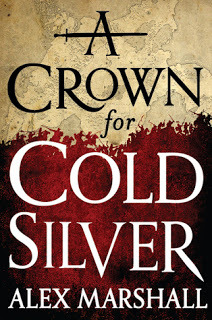 While the story maintains what I’d describe as a feeling of authenticity, it doesn’t take itself too seriously, and there’s a satirical buzz flowing along with the chapters that made me wriggle my toes in grim pleasure.
While the story maintains what I’d describe as a feeling of authenticity, it doesn’t take itself too seriously, and there’s a satirical buzz flowing along with the chapters that made me wriggle my toes in grim pleasure.
Told from multiple points of view, A Crown for Cold Silver is the first in a trilogy and brings readers into the epic years after the main players’ ‘happily ever after’ turned sour. We meet Zosia and her five Villains, veterans of a failed revolution when Zosia tried her best to tear down the Crimson Empire and bring about what I can only describe as a ‘people’s revolution’. Which didn’t work. And for 20 years, Zosia has been happily married in obscurity, having faked her own death. That is until the Crimson Empire massacres her entire village, putting the feared general on the warpath once again. And she’s a tough old bird. Even though she’s no longer young and quite as spritely.
Added to this are the machinations of the queen vs. the religious order of the Burnished Chain (so essentially secular vs. sacred rule), and a new bunch of renegades stirring up trouble in the spirit of Zosia of old. The entire novel follows assorted characters all headed towards the inevitable great battle, where old and new betrayals, reversals, and unexpected revelations are the order of the day.
What I appreciated about this novel was the way that Marshall portrays the futility of warfare for what it is, how people are wont to lie to themselves (and others) about honour, when at the end of the day everyone is reduced to so much dead flesh and gore. In the midst of it all, characters suffer existential epiphanies, while they struggle to make sense of their life goals once they realise that what they thought they wanted, isn’t necessarily for the best.
This is a deliciously ultra-violent, blood-drenched and awful story not for the faint of heart. I loved every minute of it. There were times when I thought of Pratchett’s Discworld, but just helluva darker and far denser in terms of writing.
Marshall takes all of the tropes we have grown to love about military fantasy, throws in a spot of interdimensional gates and devil-summoning, and delivers a novel that has no holy cows.
 While the story maintains what I’d describe as a feeling of authenticity, it doesn’t take itself too seriously, and there’s a satirical buzz flowing along with the chapters that made me wriggle my toes in grim pleasure.
While the story maintains what I’d describe as a feeling of authenticity, it doesn’t take itself too seriously, and there’s a satirical buzz flowing along with the chapters that made me wriggle my toes in grim pleasure.Told from multiple points of view, A Crown for Cold Silver is the first in a trilogy and brings readers into the epic years after the main players’ ‘happily ever after’ turned sour. We meet Zosia and her five Villains, veterans of a failed revolution when Zosia tried her best to tear down the Crimson Empire and bring about what I can only describe as a ‘people’s revolution’. Which didn’t work. And for 20 years, Zosia has been happily married in obscurity, having faked her own death. That is until the Crimson Empire massacres her entire village, putting the feared general on the warpath once again. And she’s a tough old bird. Even though she’s no longer young and quite as spritely.
Added to this are the machinations of the queen vs. the religious order of the Burnished Chain (so essentially secular vs. sacred rule), and a new bunch of renegades stirring up trouble in the spirit of Zosia of old. The entire novel follows assorted characters all headed towards the inevitable great battle, where old and new betrayals, reversals, and unexpected revelations are the order of the day.
What I appreciated about this novel was the way that Marshall portrays the futility of warfare for what it is, how people are wont to lie to themselves (and others) about honour, when at the end of the day everyone is reduced to so much dead flesh and gore. In the midst of it all, characters suffer existential epiphanies, while they struggle to make sense of their life goals once they realise that what they thought they wanted, isn’t necessarily for the best.
This is a deliciously ultra-violent, blood-drenched and awful story not for the faint of heart. I loved every minute of it. There were times when I thought of Pratchett’s Discworld, but just helluva darker and far denser in terms of writing.
Published on August 10, 2019 09:51
August 1, 2019
Learning How to Drown by Cat Hellisen
Many of the stories included in Learning how to Drown by Cat Hellisen are ones I’ve read before. I’ve even seen early drafts of a few of them or encountered them in publications. But revisiting them is always a pleasure, because Cat is one of those authors whose writing requires a second or even a third read, as there are always images that will be foregrounded in a different light. And with all the stories gathered, it’s striking also to see how the themes of water and transformation are so inherent in many of her tales in this collection.
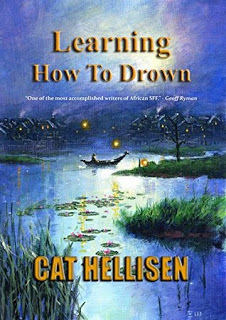 What Cat excels at, is taking the ordinary and subverting it, imbuing even everyday objects or situations with a veneer of magic and mystery, with a side order of scratchiness behind the eyes. Her focus often lies on the uneasy, complicated relationships between siblings, or parents and children, that never have truly comfortable conclusions. She’ll hint at undefinable, almost Lovecraftian weirdness that bleeds into people’s lives, irrevocably changing them – placing them at a crux point in their existence where they take the inevitable plunge into strangeness, from which there is often no return.
What Cat excels at, is taking the ordinary and subverting it, imbuing even everyday objects or situations with a veneer of magic and mystery, with a side order of scratchiness behind the eyes. Her focus often lies on the uneasy, complicated relationships between siblings, or parents and children, that never have truly comfortable conclusions. She’ll hint at undefinable, almost Lovecraftian weirdness that bleeds into people’s lives, irrevocably changing them – placing them at a crux point in their existence where they take the inevitable plunge into strangeness, from which there is often no return.
It’s difficult for me to pick favourites, but I’m going to go out on a limb anyway. The first story, “The Girls Who go Below”, is about two sisters who visit their aunt in the countryside on holiday, and practice ‘drowning’ each other in the lake. What follows is a strange coming-of-age tale, and unexpected, unconventional music making. I particularly enjoyed Cat’s descriptions of the lake and the surrounding nature.
To those who follow Cat’s ‘Hobverse’ books (you can start with When the Sea is Rising Red), “Mother, Crone, Maiden” offers important foreshadowing, though I advise you to read this prequel after When the Sea is Rising Red if you really want to have those poignant ‘aha’ moments with all the foreshadowing. This story is about choices, and how greater evils can grow out of the ones that promise a quick route to one’s heart’s desire.
Another ‘Hobverse’ story collected here that I found particularly memorable is “A Sun Bright Prison”, which plays with social prejudices, but also the consequences of giving up on that which is vital to your very essence. On the surface, this is a story about love, and it has selkies. What’s not to love about selkies?
Cat’s mythical city of Jarry exists in some other reality that is almost impossible to reach. Mortals who stray to that realm, often find themselves unable to return to our mundanity, and are forced to walk the Long Road – a kind of purgatory which is as ominous as it sounds. Only through dreaming, are people able to touch our mundane world, an act in and of itself that has inherent dangers. One story, “Dreaming Monsters” is about exactly that, bringing the protagonist into the path of the monsters that lurk there. It’s also a tale about love, sacrifice. But perhaps my favourite of the ‘Jarry’ stories is “The Face of Jarry”, and I must thank Cat for her nod to the Jane Alexander sculpture “The Butcher Boys” who ghost at the edges in an eerily familiar and unsettling way. In this tale, it’s all about a seeker’s desire for the fabled Jarry, discovered at the tattered edges of our reality … and when it is found, it is not quite what the seeker was looking for, or expected. And I loved her nasty twist at the end. That’s all I’ll say without spoiling it too much.
I could probably go on and on. For me the greatest pleasure in Cat’s writing is the sheer poetry of her words, and the liquidity of her imagery. If you’re looking for writing that will transport you out of the ordinary, then you can’t go wrong with this anthology.
 What Cat excels at, is taking the ordinary and subverting it, imbuing even everyday objects or situations with a veneer of magic and mystery, with a side order of scratchiness behind the eyes. Her focus often lies on the uneasy, complicated relationships between siblings, or parents and children, that never have truly comfortable conclusions. She’ll hint at undefinable, almost Lovecraftian weirdness that bleeds into people’s lives, irrevocably changing them – placing them at a crux point in their existence where they take the inevitable plunge into strangeness, from which there is often no return.
What Cat excels at, is taking the ordinary and subverting it, imbuing even everyday objects or situations with a veneer of magic and mystery, with a side order of scratchiness behind the eyes. Her focus often lies on the uneasy, complicated relationships between siblings, or parents and children, that never have truly comfortable conclusions. She’ll hint at undefinable, almost Lovecraftian weirdness that bleeds into people’s lives, irrevocably changing them – placing them at a crux point in their existence where they take the inevitable plunge into strangeness, from which there is often no return.It’s difficult for me to pick favourites, but I’m going to go out on a limb anyway. The first story, “The Girls Who go Below”, is about two sisters who visit their aunt in the countryside on holiday, and practice ‘drowning’ each other in the lake. What follows is a strange coming-of-age tale, and unexpected, unconventional music making. I particularly enjoyed Cat’s descriptions of the lake and the surrounding nature.
To those who follow Cat’s ‘Hobverse’ books (you can start with When the Sea is Rising Red), “Mother, Crone, Maiden” offers important foreshadowing, though I advise you to read this prequel after When the Sea is Rising Red if you really want to have those poignant ‘aha’ moments with all the foreshadowing. This story is about choices, and how greater evils can grow out of the ones that promise a quick route to one’s heart’s desire.
Another ‘Hobverse’ story collected here that I found particularly memorable is “A Sun Bright Prison”, which plays with social prejudices, but also the consequences of giving up on that which is vital to your very essence. On the surface, this is a story about love, and it has selkies. What’s not to love about selkies?
Cat’s mythical city of Jarry exists in some other reality that is almost impossible to reach. Mortals who stray to that realm, often find themselves unable to return to our mundanity, and are forced to walk the Long Road – a kind of purgatory which is as ominous as it sounds. Only through dreaming, are people able to touch our mundane world, an act in and of itself that has inherent dangers. One story, “Dreaming Monsters” is about exactly that, bringing the protagonist into the path of the monsters that lurk there. It’s also a tale about love, sacrifice. But perhaps my favourite of the ‘Jarry’ stories is “The Face of Jarry”, and I must thank Cat for her nod to the Jane Alexander sculpture “The Butcher Boys” who ghost at the edges in an eerily familiar and unsettling way. In this tale, it’s all about a seeker’s desire for the fabled Jarry, discovered at the tattered edges of our reality … and when it is found, it is not quite what the seeker was looking for, or expected. And I loved her nasty twist at the end. That’s all I’ll say without spoiling it too much.
I could probably go on and on. For me the greatest pleasure in Cat’s writing is the sheer poetry of her words, and the liquidity of her imagery. If you’re looking for writing that will transport you out of the ordinary, then you can’t go wrong with this anthology.
Published on August 01, 2019 10:22
July 19, 2019
The Usurper (King Rolen's Kin #3) by Rowena Cory Daniells
The Usurper (King Rolen’s Kin #3) by Rowena Cory Daniells sees me finally putting this trilogy to bed. I’ve got many thoughts about this epic, and they’re conflicted, so bear with me. Daniells starts out with all the elements that I love about a meaty fantasy trilogy – courtly intrigue, royal heirs thrust into unwished-for situations, treachery and a side order of the occasional fantasy beast. But…
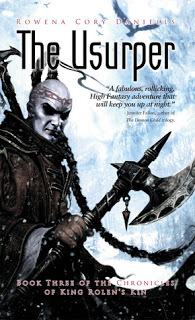 I think she took a leaf out of the GRRM handbook but didn’t flesh things out nor develop her narrative arcs fully. So, while things started out promising (I really did enjoy book one and two) by the time we hit book three, I gained a nagging suspicion that she was pantsing her way through the epic without any clear idea of where or how to end.
I think she took a leaf out of the GRRM handbook but didn’t flesh things out nor develop her narrative arcs fully. So, while things started out promising (I really did enjoy book one and two) by the time we hit book three, I gained a nagging suspicion that she was pantsing her way through the epic without any clear idea of where or how to end.
There are so many promising characters and some lovely interactions, for instance friendships that develop in unlikely places (no, I’m not going to spoil it). I found myself enjoying those secondary arcs more than I did the primary ones, which all seemed rather standard (winning back the crown at all cost, etc etc).
I feel more could have been made of the theme of characters having to cope with the lot handed to them in life – Byren the reluctant king; Fin, the warrior monk who doesn’t have a shred of magical ability; Piro the princess who has all the magical ability but needs to keep it hidden… And while the writing is solid, I often felt that the point of view did not go deep enough – especially in terms of crisis situation which felt almost a little glossed over – I’m thinking of the ending in particular (you blink, and it’s over in a whiff of vapour). Too many conveniences – for instance, instead of executing someone you dislike the moment you lay hands on them, why then apparently starve them to death very publicly when you know they have sympathisers who’ll no doubt try to save them. (It feels too much like the Disney villain whose gloating ends up being his undoing.)
As much as I wanted to love Byren, there were times when I felt he was almost too trusting, too obstinately obtuse about the people and their feelings around him – not quite in the TSTL category, but verging very near to that. Not to mention his bungling of his friendship with Orrie.
I think what stole most of the joy of the story for me was the way it felt rushed towards the conclusion after events dragged out midway in the trilogy, as if the author had gone off on a bunch of tangents but then wasn’t exactly quite sure how to wrap them all together for a satisfying ending – but had to, within a specified word count. And it’s difficult. I understand all too well when writing merely one character’s narrative arc. And we’re sitting with not one but three point-of-view characters here. So, though I don’t want to lean on the GRRM reference too hard, it’s painfully apparent here. Added to that, the author flips between points of view rapidly, sometimes within a scene. Now, I don’t know if it was how the book was formatted (I was reading the ebook so don’t know if those spaces accimagically vanished during the final production) but I’d have liked some scene breaks indicated – I sometimes had to stop and go back a few sentences to realise we’d switched characters. And if no scene breaks, a better transition could have smoothed this out. Not a complete deal-breaker, because I don’t know if it is a formatting glitch, but if not…
I wanted to like this trilogy very much, and it had such a promising start, but I’ve been spoilt by so many more complex, textured and lush fantasy writing that this felt like something I may have enjoyed more when I was in my early teens. I know I’ve gone on a bit in this review, more than I ordinarily would, and King Rolen’s Kin is not a bad little fantasy trilogy, but it could have packed a stronger punch to conclude better at book three.
 I think she took a leaf out of the GRRM handbook but didn’t flesh things out nor develop her narrative arcs fully. So, while things started out promising (I really did enjoy book one and two) by the time we hit book three, I gained a nagging suspicion that she was pantsing her way through the epic without any clear idea of where or how to end.
I think she took a leaf out of the GRRM handbook but didn’t flesh things out nor develop her narrative arcs fully. So, while things started out promising (I really did enjoy book one and two) by the time we hit book three, I gained a nagging suspicion that she was pantsing her way through the epic without any clear idea of where or how to end.There are so many promising characters and some lovely interactions, for instance friendships that develop in unlikely places (no, I’m not going to spoil it). I found myself enjoying those secondary arcs more than I did the primary ones, which all seemed rather standard (winning back the crown at all cost, etc etc).
I feel more could have been made of the theme of characters having to cope with the lot handed to them in life – Byren the reluctant king; Fin, the warrior monk who doesn’t have a shred of magical ability; Piro the princess who has all the magical ability but needs to keep it hidden… And while the writing is solid, I often felt that the point of view did not go deep enough – especially in terms of crisis situation which felt almost a little glossed over – I’m thinking of the ending in particular (you blink, and it’s over in a whiff of vapour). Too many conveniences – for instance, instead of executing someone you dislike the moment you lay hands on them, why then apparently starve them to death very publicly when you know they have sympathisers who’ll no doubt try to save them. (It feels too much like the Disney villain whose gloating ends up being his undoing.)
As much as I wanted to love Byren, there were times when I felt he was almost too trusting, too obstinately obtuse about the people and their feelings around him – not quite in the TSTL category, but verging very near to that. Not to mention his bungling of his friendship with Orrie.
I think what stole most of the joy of the story for me was the way it felt rushed towards the conclusion after events dragged out midway in the trilogy, as if the author had gone off on a bunch of tangents but then wasn’t exactly quite sure how to wrap them all together for a satisfying ending – but had to, within a specified word count. And it’s difficult. I understand all too well when writing merely one character’s narrative arc. And we’re sitting with not one but three point-of-view characters here. So, though I don’t want to lean on the GRRM reference too hard, it’s painfully apparent here. Added to that, the author flips between points of view rapidly, sometimes within a scene. Now, I don’t know if it was how the book was formatted (I was reading the ebook so don’t know if those spaces accimagically vanished during the final production) but I’d have liked some scene breaks indicated – I sometimes had to stop and go back a few sentences to realise we’d switched characters. And if no scene breaks, a better transition could have smoothed this out. Not a complete deal-breaker, because I don’t know if it is a formatting glitch, but if not…
I wanted to like this trilogy very much, and it had such a promising start, but I’ve been spoilt by so many more complex, textured and lush fantasy writing that this felt like something I may have enjoyed more when I was in my early teens. I know I’ve gone on a bit in this review, more than I ordinarily would, and King Rolen’s Kin is not a bad little fantasy trilogy, but it could have packed a stronger punch to conclude better at book three.
Published on July 19, 2019 11:38
July 10, 2019
Tomorrow by Damian Dibben
The premise for Tomorrow by Damian Dibben bit me from the start – an immortal hound is separated from his equally immortal owner and spends more than a century searching for him throughout Europe. Tomorrow blends elements of fantasy with luscious prose, through a layered alchemical process that results in a novel that is difficult to pin down. (There’s quite a lot going on beneath the surface.)
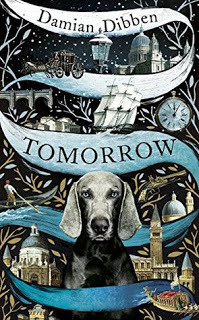 My first thought upon finishing was that Tomorrow reminds me somewhat of Paul Gallico’s classics, such as Jennie or Thomasina, the Cat Who Thought She Was God – both novels my mother inspired me to read when I was little. Granted, it’s been decades since I’ve read any Gallico, so this comparison might just be wishful thinking on my part.
My first thought upon finishing was that Tomorrow reminds me somewhat of Paul Gallico’s classics, such as Jennie or Thomasina, the Cat Who Thought She Was God – both novels my mother inspired me to read when I was little. Granted, it’s been decades since I’ve read any Gallico, so this comparison might just be wishful thinking on my part.
But I’m a sucker for a novel written from an animal’s point of view, and Tomorrow (yes, that’s the dog’s name) offers such an evocative window into Europe between the 1600s and 1800s. At a glance, this story may be about a dog trying desperately to reunite with his owner, but the story is much, much more than that.
A pervading theme makes us question the value of life – would we value our existence if it was limitless? Tomorrow and his master, Valentyne, both enjoy an eternal life that is juxtaposed with the ephemeral; when we meet secondary characters such as the indomitable Sporco or the sensitive Blaise, whose lives are but instants in those of our protagonists, these short-lived characters’ vitality and ‘presentness’ becomes all the more apparent. We examine also the complex relationship between two men – Valentyne and his counterpart Vilder. Each copes with eternity in different ways: Valentyne by working to preserve the lives of others and bring them comfort, and Vilder, by pursuing a more hedonistic, self-centred life. Neither seem to gain any satisfaction through their actions, and through the ages are locked in a love/hate relationship.
We see also, a Europe turned upside down by war, with graphic illustration of the battle of Waterloo and the resultant carnage that is brought to life in such a way that will leave you in no doubt that war is far from noble. Threaded through this is a search for meaning, because a life without the limitations placed upon it by death, can easily become meaningless.
Tomorrow is not a happy read, but it is filled with evocative prose and astute observations. In addition, the novel jumps backwards and forwards in time, and this non-linear execution may be confusing to some. If viewed in a linear way, the plot isn’t all that developed – there are patches that fall flat, and are propped up by the author’s lush style. So, this is more a novel about internal alchemy for Valentyne, in which we are not privy to his thoughts, but we view his journey through the lens of his loyal dog. In that sense, I don’t think this novel is going to be for everyone, but it’s certainly a memorable story that will prey on my mind for a while yet.
 My first thought upon finishing was that Tomorrow reminds me somewhat of Paul Gallico’s classics, such as Jennie or Thomasina, the Cat Who Thought She Was God – both novels my mother inspired me to read when I was little. Granted, it’s been decades since I’ve read any Gallico, so this comparison might just be wishful thinking on my part.
My first thought upon finishing was that Tomorrow reminds me somewhat of Paul Gallico’s classics, such as Jennie or Thomasina, the Cat Who Thought She Was God – both novels my mother inspired me to read when I was little. Granted, it’s been decades since I’ve read any Gallico, so this comparison might just be wishful thinking on my part.But I’m a sucker for a novel written from an animal’s point of view, and Tomorrow (yes, that’s the dog’s name) offers such an evocative window into Europe between the 1600s and 1800s. At a glance, this story may be about a dog trying desperately to reunite with his owner, but the story is much, much more than that.
A pervading theme makes us question the value of life – would we value our existence if it was limitless? Tomorrow and his master, Valentyne, both enjoy an eternal life that is juxtaposed with the ephemeral; when we meet secondary characters such as the indomitable Sporco or the sensitive Blaise, whose lives are but instants in those of our protagonists, these short-lived characters’ vitality and ‘presentness’ becomes all the more apparent. We examine also the complex relationship between two men – Valentyne and his counterpart Vilder. Each copes with eternity in different ways: Valentyne by working to preserve the lives of others and bring them comfort, and Vilder, by pursuing a more hedonistic, self-centred life. Neither seem to gain any satisfaction through their actions, and through the ages are locked in a love/hate relationship.
We see also, a Europe turned upside down by war, with graphic illustration of the battle of Waterloo and the resultant carnage that is brought to life in such a way that will leave you in no doubt that war is far from noble. Threaded through this is a search for meaning, because a life without the limitations placed upon it by death, can easily become meaningless.
Tomorrow is not a happy read, but it is filled with evocative prose and astute observations. In addition, the novel jumps backwards and forwards in time, and this non-linear execution may be confusing to some. If viewed in a linear way, the plot isn’t all that developed – there are patches that fall flat, and are propped up by the author’s lush style. So, this is more a novel about internal alchemy for Valentyne, in which we are not privy to his thoughts, but we view his journey through the lens of his loyal dog. In that sense, I don’t think this novel is going to be for everyone, but it’s certainly a memorable story that will prey on my mind for a while yet.
Published on July 10, 2019 10:59



